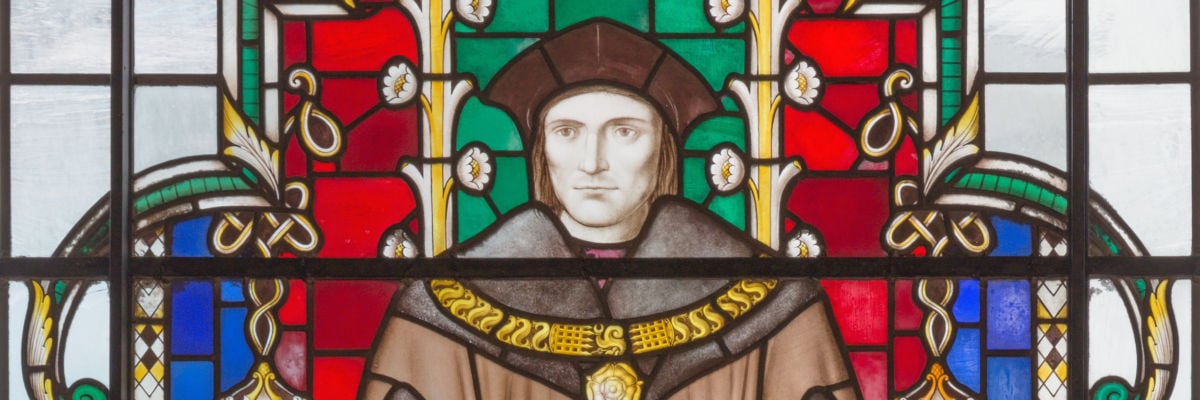
On June 22, Catholics commemorate two of the more prominent martyrs of the English Reformation: St. Thomas More and St. John Fisher. They are far from the only English martyrs of that period, though they are the most eminent clergymen to die for their resistance to Henry VIII’s claims of supremacy for the Church of England. In the general Roman calendar, their commemoration is optional (the day can go without observance or be given to another saint, Paulinus of Nola) except in England, where it is celebrated as a feast.
In a curious historical twist, the current calendar of the Church of England also commemorates these two martyrs, on July 6. The date discrepancy of their common remembrance is not very interesting—Thomas More died on July 6, John Fisher on June 22—but it is indeed striking that the established Protestant church of the realm would officially celebrate these two men, who died, in a certain sense, at her own hands, precisely to oppose her existence.
How might we explain this apparent reversal? A few observations will shed light on the circumstances. First, we ought to note that this observation dates to the latter part of the twentieth century and the publication in 2000 of Common Worship, the Church of England’s contribution to the liturgical reform movements of the previous century. Rather than revise the 1662 Book of Common Prayer, English Anglicans opted for a kind of “resource” book with various options. This included a much expanded calendar for lesser feasts and commemorations—far more, that is, than the sparse observances of the prayer book calendar. All of this is to say that More and Fisher, in the Anglican calendar, are very much more “optional” than anything we know in the Catholic liturgical world. The observance is limited to England (there is no universal sanctoral calendar in the Anglican Communion) and further limited to those who wish to observe it.
Some of those who might wish to observe it are high church Anglicans or “Anglo-Catholics,” who, following the Oxford Movement in the nineteenth century, seek to highlight the continuities between Anglicanism and pre-Reformation English Catholicism. Indeed, in the years following Vatican II, it was not unusual to find English Anglo-Catholics simply using the liturgical books of Pope Paul VI in their Anglican churches! For such groups, it would make perfect sense to celebrate Fisher and More.
But what about the Anglicans of a more Reformed persuasion, who might be horrified to endorse the views of More and Fisher? No doubt, some of these people were in fact distressed at this inclusion in the calendar. But here we should note that Anglicanism, whether in the Church of England or abroad, simply has no single universal understanding of what it means to recognize a “saint.” You can find Anglicans who speak much like Catholics, who venerate the saints and ask for their intercession; you can find Anglicans who sound more like Calvinists and find the whole business of saints distasteful and even heretical. Although the Anglican churches do maintain calendars, they do not tell their members exactly what these observances mean. There is certainly no congregation in charge of canonizations; there is not even anything like “canonization.” Inclusion in an Anglican calendar is, for the most part, a product of synodal deliberation and majority vote at the level of provinces or national churches.
Further, for comparison, we ought to note that these modern Anglican calendars are inclusive of more than Reformation-era Catholic saints. More and Fisher are just the tip of the iceberg. In the calendar of the American Episcopal Church, for example, you’ll find not just More and Fisher, but also St. Vincent de Paul and Pope John XXIII, as well as figures who were neither Anglican nor Catholic, like Johann Sebastian Bach, Martin Luther King, Jr., and Harriet Tubman.
In light of these inclusions—some of which, in my experience, are confusing even to many Anglicans—it is maybe not so strange to see controversial figures like Fisher and More. For the last several decades, Anglican calendar revisions have served more as the symbolic battleground for various political and religious causes than as an actual expression of worship. Perhaps More and Fisher are proposed—in characteristic postmodern fashion—as heroes of a kind of unbounded conscience whose value resides in itself alone. In other words, they may have been wrong, but we can celebrate their willingness to stand for what they believed.
The classical Thomistic understanding of courage would counter that true virtue consists not in generic bravery, but in bravery for what is truly good. A theology of sanctity that promotes merely the goodness of voluntarist individualism may function well to support the religious secularism of the modern west, but it can offer little to illuminate classical Christian interest in the good, the true, and the beautiful.


